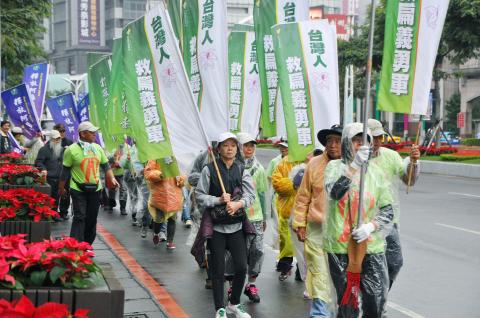Members of a pro-independence group yesterday completed a 36-day walk around the country as they called on the authorities to end what they termed “autocratic control of the judiciary” and for the release of jailed former president Chen Shui-bian (陳水扁).
The walk, initiated by the Alliance of Referendum for Taiwan, arrived at Banciao Railway Station in New Taipei City (新北市) yesterday morning. They braved the cold and rain, and at noon reached Ketagalan Boulevard in front of the Presidential Office in Taipei, where an overnight protest was scheduled.
Dozens of people joined the walk, which commenced at Taipei Veterans General Hospital in Taipei on Nov. 3.

Photo: CNA
The group walked through Keelung, Yilan, Hualien, Taitung and Pingtung counties, as well as the cities and counties on the west coast before arriving back in Taipei.
The activists clashed with police earlier yesterday when the alliance’s convener, Tsay Ting-kuei (蔡丁貴), and a few others went to the Ketagalan Boulevard to appraise their scheduled protest location.
Tsay said the group should be granted the whole of Ketagalan Boulevard for the protest, but police officers insisted lanes be left open for traffic and forcefully removed Tsay and the others.
During the clash, Tsay fell to the ground and was afterwards sent to hospital for treatment.
According to former Northern Taiwan Society director Janice Chen (陳昭姿), who visited Tsay in hospital, Tsay will stay hospitalized for further observation as he may have suffered a concussion.
Having served four years of a lengthy prison sentence after being convicted of corruption during his term in office, Chen, who is serving an 18-and-a-half-year sentence for corruption, was admitted to Taipei Veterans General Hospital on Sept. 21.
He was later diagnosed with severe depression, with symptoms of anxiety and somatization disorder. He has been on escorted visits to the hospital since then.

Chinese spouse and influencer Guan Guan’s (關關) residency permit has been revoked for repeatedly posting pro-China videos that threaten national security, the National Immigration Agency confirmed today. Guan Guan has said many controversial statements in her videos posted to Douyin (抖音), including “the red flag will soon be painted all over Taiwan” and “Taiwan is an inseparable part of China,” and expressing hope for expedited reunification. The agency last year received multiple reports alleging that Guan Guan had advocated for armed reunification. After verifying the reports, the agency last month issued a notice requiring her to appear and explain her actions. Guan

GIVE AND TAKE: Blood demand continues to rise each year, while fewer young donors are available due to the nation’s falling birthrate, a doctor said Blood donors can redeem points earned from donations to obtain limited edition Formosan black bear travel mugs, the Kaohsiung Blood Center said yesterday, as it announced a goal of stocking 20,000 units of blood prior to the Lunar New Year. The last month of the lunar year is National Blood Donation Month, when local centers seek to stockpile blood for use during the Lunar New Year holiday. The blood demand in southern Taiwan — including Tainan and Kaohsiung, as well as Chiayi, Pingtung, Penghu and Taitung counties — is about 2,000 units per day, the center said. The donation campaign aims to boost

The Kaohsiung Tourism Bureau audited six hotels in an effort to prevent price gouging ahead of Korean band BTS’ concert tour in the city scheduled for Nov. 19, 21 and 22 this year. The bureau on Friday said that the audits — conducted in response to allegations of unfair pricing posted on social media — found no wrongdoing. These establishments included the local branches of Chateau de Chine, Hotel Nikko, My Humble House, and Grand Hai Lai, it said, adding that the Consumer Protection Commission would have penalized price gougers had the accusations been substantiated. The bureau said the Tourism Development Act

The military yesterday said it has located the flight data recorder, or black box, of an F-16V jet that disappeared off eastern Taiwan earlier this month, and it would soon deploy a salvage team to try to retrieve it. Air Force Command Headquarters said that while it had pinned down the location of the black box, it was still searching for the aircraft’s sole pilot, air force Captain Hsin Po-yi (辛柏毅). Without providing details, the air force said it had located the black box days after detecting some intermittent signals and would now engage a team of professionals to retrieve it. The air